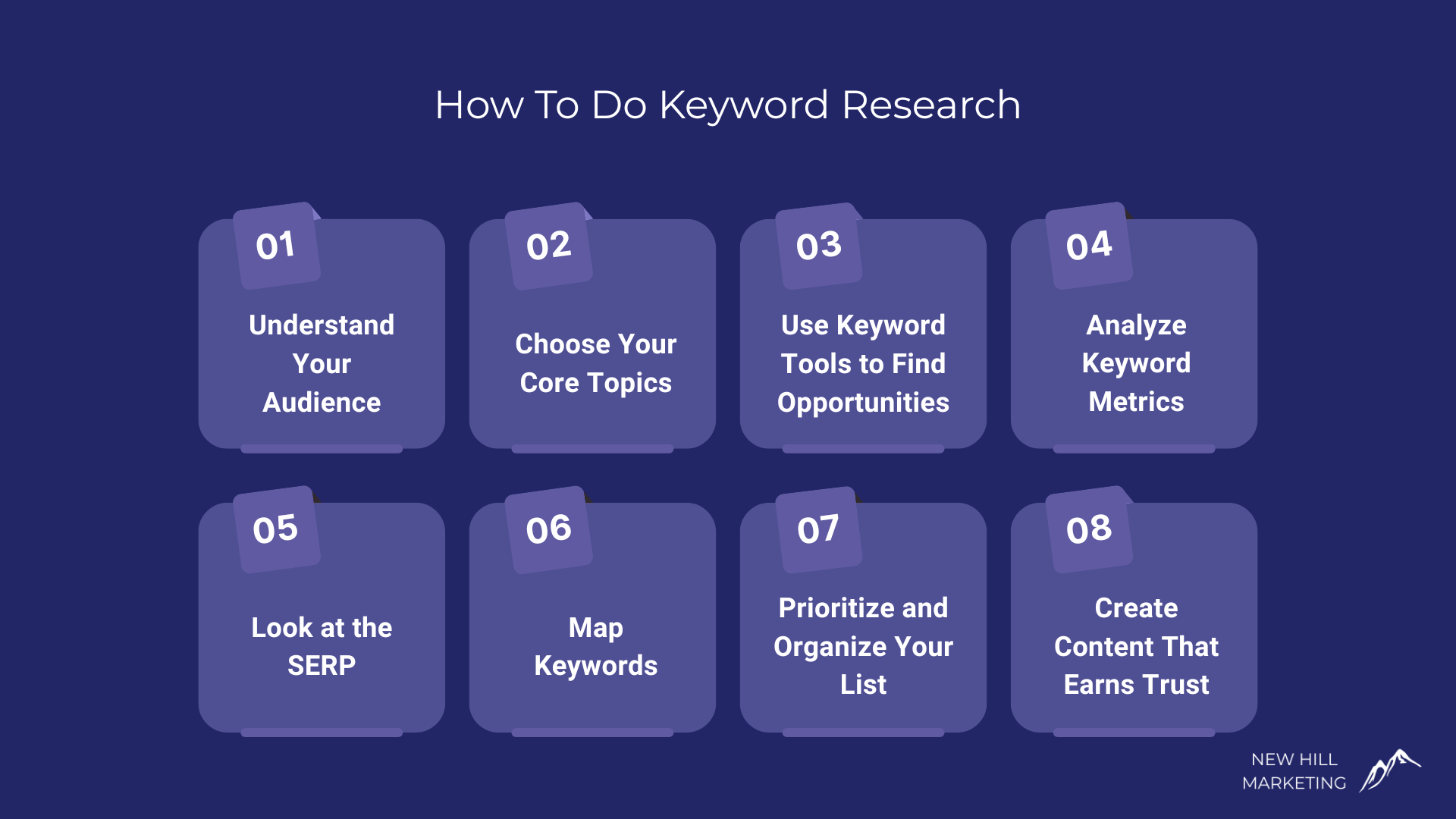How to Do Keyword Research: A 2025 Guide for SEO Success
If you want your content to rank on Google, show up in AI Overviews, and reach the right audience across platforms, you need keyword research. It’s one of the most important building blocks of any SEO strategy, and yet it’s one of the most misunderstood.
Let’s go over what keyword research is, why it matters, and how to do keyword research the right way in today’s evolving search landscape. Whether you're a business owner, marketer, or content creator, this guide will help you stop guessing and start ranking.
Key Takeaways
Keyword research is the foundation of every well-planned SEO strategy, helping you understand your audience and target the right terms.
It’s about finding keywords that match search intent, not just those with high search volume.
Use tools like Google Keyword Planner, Semrush, or Ahrefs to discover opportunities and evaluate metrics.
Focus on a variety of long-tail and short-tail keywords to balance quick wins and long-term growth.
Always analyze the SERPs to understand competition and the types of content ranking.
Connect keywords to each stage of the buyer journey for a full-funnel content strategy.
Good keyword research must lead to helpful, optimized content; keywords alone won’t drive results.
Refresh your keyword strategy every 3–6 months to stay competitive and adapt to new search trends.
Pair keyword research with SEO writing to create content that ranks while resonating with your audience.
What Is Keyword Research?
Keyword research is the process of finding and analyzing the words and phrases people use when searching online. Typically, it’s to determine what people are looking for when searching for your services or products.
These “keywords” reflect real questions, problems, and interests, and knowing them helps you create content that actually gets found.
It’s not just about picking popular words.
Great keyword research helps you:
Understand what your audience is looking for
Match their intent with helpful, relevant content
Identify opportunities your competitors may be missing
Build topic clusters that grow traffic over time
In other words: Keyword research connects business goals with real search behavior.
Why Keyword Research Still Matters in 2025
We get it, search is changing. But, to be fair, it’s always changing.
In today’s world, we have the rise of AI Overviews, TikTok being used as a search engine, and conversational platforms like ChatGPT helping to cut out searching completely, some marketers wonder if traditional SEO keyword research is still worth it.
Here’s the short answer: yes, but it’s evolving.
Today’s best-performing content isn’t just optimized for Google; it’s aligned with human intent. Keyword research helps you meet users wherever they’re searching, whether that’s in a browser, chatbot, or social app.
Done well, SEO keyword research helps you:
Rank in traditional search results (yes, still critical)
Earn mentions in AI-powered answers
Create content that performs across platforms
Drive traffic, leads, and revenue, not just clicks
How To Do Keyword Research
Step 1: Understand Your Audience
Before you open any tools, get clear on who you’re trying to reach. Keyword research starts with empathy: what’s going on in your ideal customer’s world?
Ask yourself:
What problems are they trying to solve?
What words do they use to describe those problems?
What would they type (or say) when looking for solutions?
Pro tip: Talk to your sales or support team. They hear your customers’ pain points every day and can give you real-world language your audience uses.
Step 2: Choose Your Core Topics
Once you understand your audience, identify 1–3 core topics that matter to your business. These should be:
Highly relevant to your products or services
Aligned with your business goals
Broad enough to support multiple pieces of content
If you’re having a hard time deciding on topics, go to your competitors' websites and see the type of content they’re writing.
Pro tip: Don’t pick too many topics at once. Focusing on just a few helps you create deeper, more authoritative content that ranks better.
Step 3: Use Keyword Tools to Find Opportunities
There are plenty of tools out there to get an idea of the type of content you should create, and you don’t need to pay to get the best data.
A few we recommend:
Google Keyword Planner (free)
Semrush or Ahrefs (paid)
Keywords Everywhere (paid)
Answer the Public (paid)
Google Trends (free)
Pro tip: Start with a “seed keyword” (like “stress relief”) and see what related phrases people search for right in Google. Then look at the “People Also Ask” box to find even more ideas!
Step 4: Analyze Keyword Metrics (But Don’t Obsess)
When you start diving into keyword suggestions, pay attention to a few key metrics that’ll tell you how important each keyword is.
Search volume
Search volume tells you how many times people search for a keyword each month. It’s a good starting point for understanding demand, but don’t assume high volume is always better.
A keyword with 20,000 monthly searches may be too competitive or too broad to drive quality leads, while a keyword with 200 searches could be highly targeted and lead to conversions.
Keyword difficulty (KD)
Keyword difficulty gives you an idea on how hard it’s going to be to rank for a specific keyword based on the competition. A high KD means you’ll be competing with big, established sites that already have authority. A lower KD means you have a better chance of ranking, even if your website is newer or has a smaller backlink profile.
Intent
Search intent tells you why someone is searching for that keyword. Are they just looking for information (informational intent), comparing options (commercial intent), or ready to buy (transactional intent)?
Matching your content to the correct intent is one of the most important parts of SEO keyword research because it determines whether your page meets the searcher’s needs.
Cost per Click (CPC)
CPC is what advertisers are willing to pay for a click on a keyword in Google Ads. While CPC is mainly used for paid search, it can also show you how valuable a keyword is. If advertisers are willing to spend a lot on a keyword, chances are it has strong commercial intent and could drive revenue for your business.
Pro tip: Prioritize keywords that are relevant to your audience, despite their search volume. A smaller, highly qualified audience is more valuable than big traffic that never converts.
Step 5: Look at the SERP (Search Engine Results Page)
Before committing to a keyword, Google it.
Here’s what you’re looking for:
What types of content are ranking?
Are there featured snippets or AI overviews?
Who are the competitors?
Pro tip: If every result is from massive websites like Forbes or Mayo Clinic, it may be too competitive. Look for keywords where smaller sites are ranking; it’s a better opportunity.
Step 6: Map Keywords to the Buyer Journey
A strong keyword strategy supports users at every stage:
Top of funnel (TOFU): Informational searches like “what is keyword research”
Middle of funnel (MOFU): Solution-aware terms like “best keyword research tools”
Bottom of funnel (BOFU): Transactional keywords like “seo keyword research service”
Pro tip: Start with BOFU keywords (the ones closest to conversion). Then build supporting content that leads people to those conversion-focused pages.
Step 7: Prioritize and Organize Your List
Keyword research can get overwhelming fast. Once you’ve collected ideas, create a simple spreadsheet to organize them.
Columns to include:
Focus keyword
Intent
Search volume
Keyword difficulty
Suggested content type
Priority
Pro tip: Use color coding, green for high-priority, yellow for medium, and red for low. It makes planning and delegating much easier.
Step 8: Create Content That Earns Trust (and Ranks)
This is the fun part, at least for me it is. It’s time to get into the real work: writing.
But here’s a secret: Good keyword research won’t help bad content.
Every piece of content should:
Match the keyword’s intent
Deliver value beyond what’s already out there
Use keywords naturally in the title, URL, meta description, and the first 100 words
Include clear headings, internal links, and alt text on images
Pro tip: Refresh old content too. Updating an existing post with new keywords and examples can give it a huge SEO boost.
Ready to Turn Keywords Into Conversions?
At New Hill Marketing, we don’t just find keywords; we build keyword strategies that drive real results. From research and topic clusters to optimized content and reporting, we’re here to help your business grow.
Let’s create a keyword strategy that works for you. Reach out to New Hill Marketing today and get started.
Frequently Asked Questions About Keyword Research
What Is Keyword Research?
Keyword research is the process of finding and analyzing the search terms your audience uses online. It helps you focus on creating content that matches search intent, improves visibility on Google and AI-powered platforms, and drives qualified traffic to your website.
Why Is Keyword Research Important For Seo?
Without keyword research, you risk creating content no one is searching for. Good SEO keyword research ensures your pages target terms with real demand, helping you rank higher, get more clicks, and attract leads that are more likely to convert.
How Do I Start Keyword Research For Seo?
Start by identifying your audience’s problems and questions, then brainstorm core topics that align with your business. From there, use tools like Google Keyword Planner, Semrush, or Ahrefs to find relevant keywords, evaluate their metrics, and build a prioritized list.
What Makes A Good Keyword?
A strong keyword is relevant to your business, matches the searcher’s intent, and is realistic for your website to rank for based on competition. High search volume isn’t everything—sometimes lower-volume keywords lead to better conversions.
Should I Focus On Long-Tail Or Short-Tail Keywords?
Ideally, both. Long-tail keywords are more specific, and they’re often easier to rank for, while short-tail keywords have higher volume but are usually more competitive. A healthy keyword strategy includes a mix of both for short- and long-term wins.
How Often Should I Update My Keyword Strategy?
Search trends change frequently. Revisit your keyword strategy every 3–6 months to find new opportunities, refresh old content, and stay ahead of competitors.
Can I Do Keyword Research Without Paid Tools?
Yes! Google Keyword Planner or Google Trends are great for helping you brainstorm ideas. However, paid tools like Semrush or Ahrefs provide deeper data on metrics like keyword difficulty, traffic potential, and competitor rankings.
We recommend starting with the free tools, and as you start to get more serious about ranking, upgrade to a paid platform at that point.
What Is The Difference Between Keyword Research And Seo Writing?
Keyword research is about finding the right terms to target, while SEO writing is about creating high-quality content optimized for those keywords. They go hand-in-hand to help you rank and convert.




